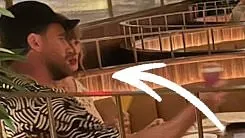
Did Drill Rap Lead to a Killer's Return to Custody? The Shocking Overlap Between Music and Crime
2025-01-18
Author: Ying
Introduction
In a chilling turn of events, a man convicted of murder in 2009 has once again found himself in the spotlight after a recent tabloid revelation linked him to his career as a drill rap artist. Jake Fahri, known as TEN while donning a balaclava to perform, was previously sentenced to life in prison for the brutal murder of 16-year-old Jimmy Mizen in a bakery confrontation. His shocking transformation from convicted killer to music artist raises significant questions about the influence of drill rap, a genre often criticized for glorifying violence.
Backlash Against Fahri's Music
Fahri, who was released conditionally in 2023 after serving part of his sentence, has faced backlash as his songs depict themes of crime, violence, and retribution. Lyrics that boast of being "a killer in the streets" have caused discomfort, particularly for the Mizen family, who expressed their disgust at discovering that Fahri’s musical career seemingly exploits the tragedy of their son's death.
Family's Anguish
In a poignant statement, Barry Mizen, Jimmy's father, articulated the family’s outrage: “For him to be making money out of what he did to our son—it feels wrong to me.” His wife, Margaret, remarked on the emotional pain of hearing music that references their son. “It was incredibly painful. He took Jimmy’s life,” she lamented.
Wider Implications of Drill Music
Beyond their personal anguish, the Mizens worry about the broader implications of drill music, asserting it sends a dangerous message to impressionable youth. Margaret likened the current social climate in Britain to a “war,” suggesting that music like TEN's acts as a catalyst for violence.
Media Scrutiny and Response
The controversy escalated to the point where the BBC faced scrutiny for playing TEN's tracks on a radio show featuring emerging British artists. Following mounting pressure, the BBC clarified that it had no plans to feature his music again, asserting they were unaware of his criminal past and unequivocally do not condone his actions.
Fahri's Apology and Justification
In a bid to address the uproar, Fahri issued a statement on social media apologizing to the Mizen family, emphasizing that his lyrics were meant as artistic expressions of his tumultuous life rather than intended as glorifications of violence. “None of my lyrics are aimed at the victim or his family,” he insisted, adding that he sought to move beyond his past.
The Evolution of Drill Music
Drill music, which originated in Chicago over ten years ago, has proliferated in cities worldwide, including London and New York, igniting fervent discussions over the lines between creative expression and public safety. Proponents of the genre argue that it reflects the struggles of marginalized communities, while critics believe it incites real-world violence.
Authorities and Censorship Debate
Authorities have cracked down on drill musicians, citing connections to violent crime, leading to a debate about censorship's role in protecting society. As numbers regarding violent incidents in cities rise, tensions continue to mount over whether this style of music should be silenced or if it serves a crucial role in depicting harsh realities.
The Complex Relationship of Crime and Music
Interestingly, as Fahri attempts to rebuild his life post-incarceration, the negative attention may ironically boost his visibility in a music scene that often romanticizes the criminal lifestyle. The Mizen family's fears that he may gain fame as a "celebrity" instead of a cautionary tale underscore the complex relationship between crime, music, and public perception in today's culture.
Conclusion
As discussions about drill rap's role in society evolve, the case of Jake Fahri serves as a striking reminder of the fine line between artistic expression and the painful realities of violence—leaving many to wonder about the future of both the artist and the embattled genre.


 Brasil (PT)
Brasil (PT)
 Canada (EN)
Canada (EN)
 Chile (ES)
Chile (ES)
 Česko (CS)
Česko (CS)
 대한민국 (KO)
대한민국 (KO)
 España (ES)
España (ES)
 France (FR)
France (FR)
 Hong Kong (EN)
Hong Kong (EN)
 Italia (IT)
Italia (IT)
 日本 (JA)
日本 (JA)
 Magyarország (HU)
Magyarország (HU)
 Norge (NO)
Norge (NO)
 Polska (PL)
Polska (PL)
 Schweiz (DE)
Schweiz (DE)
 Singapore (EN)
Singapore (EN)
 Sverige (SV)
Sverige (SV)
 Suomi (FI)
Suomi (FI)
 Türkiye (TR)
Türkiye (TR)
 الإمارات العربية المتحدة (AR)
الإمارات العربية المتحدة (AR)